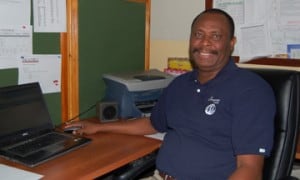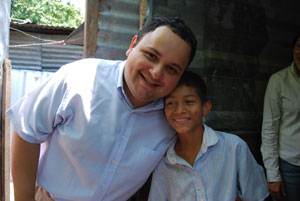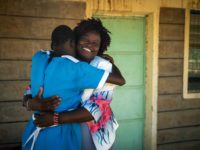Okay, everyone. Limber up those fingers. It’s time for the next round of Ask the Field. It’s time for you to ask questions of two of my fabulous coworkers, Ephraim Lindor of Haiti and Roberto Medrano of El Salvador.
 Ephraim has been working with Compassion Haiti for 22 years. (Talk about perseverance!)
Ephraim has been working with Compassion Haiti for 22 years. (Talk about perseverance!)
He first worked for Compassion as a translator, and he is now the field communications supervisor for Haiti. His daily work includes interviewing Compassion beneficiaries and writing stories about their success.
Ephraim is always smiling, and he loves watermelon. Besides all the work he does for Compassion, he’s a pastor at his local church, a loving father of a 21-year-old woman and a 15-year-old boy, and a loving husband of 23 years.
 Roberto has been working with Compassion El Salvador for 6 years. He first worked for Compassion as field communications specialist and now he is the communications and tours specialist for Central America and the Caribbean, which means he is in charge of training and supporting all Compassion countries in that region for communications and tours. (He’s a busy guy!)
Roberto has been working with Compassion El Salvador for 6 years. He first worked for Compassion as field communications specialist and now he is the communications and tours specialist for Central America and the Caribbean, which means he is in charge of training and supporting all Compassion countries in that region for communications and tours. (He’s a busy guy!)
Roberto is the youth pastor of his church, and although he is just 30 years old, he has been preaching for more than 26 years. He was a child preacher, and that is one of the reasons why he loves Compassion’s ministry — he has witnessed first hand the impact of God’s Word when you are a child. He is crazily in love with his beautiful wife, Yolanda, an ORU graduate that fully supports him in working on behalf of children.
So now it’s your turn to ask away! You know the drill by now — I’ll choose 10 of your questions for them to answer.







14 Comments |Add a comment
What do you like most about your job?
What is the most important thing you would like to tell sponsors?
How have you seen God work trhough the ministry of Compassion this week?
Ephraim — I met you on an Advocate’s tour to Haiti and you were an awesome tour guide! You have the most wonderful smile and laughter! Visiting your country — and meeting the wonderful people there (including my sponsored child of 16 years) — was one of the highlights of my life. Any idea how many guests you have welcomed and translated for in 22 years? I’ll never forget playing “Duck Duck Goose” with the kids, which I believe was “Kana Kana Zwa” in Creole.
How many games of Duck Duck Goose have you played (or translated)?
This is for both of you. I just found out that one of my sponsored children has been sponsored four times in the past six years. I was wondering what type of affect this has on the children. Do they get to the point where they are not even excited to be sponsored anymore? Maybe they feel like it is just one more person that will let them down. Can you tell me if this is a common occurence? Thanks.
Hi Ephraim and Roberto! God bless you both.
I’m curious about how the global food crisis is affecting both of your countries, and I was glad to see that others had already asked questions about that.
I would love to hear your favorite stories of children in your programs whose lives were really turned around by being part of Compassion.
Thanks for taking the time to answer our questions!
Lots of questions for Ephraim:
When a boy or girl completes the program in Haiti, do they have a degree comparable to a U.S. high school degree? Is their training primarily academic or vocational? What types of skilled jobs are there in the rural areas (in other words, do they need to move out of their rural communities in order to use their new skills to make a living?) What type of job do most graduates obtain? What percentage continue on for more formal education through LDP or by other means?
Country information on the Compassion web site states that approximately half the population practices voodoo. Is this true of families whose children are enrolled in the program?
There are no Haitian children listed as “orphans” on the web site; however, when I click on individual pictures, it is not unusual to find some who are living with grandparents, aunts or uncles. Is there a cultural reason for not referring to these children as orphans?
Is Compassion Haiti doing anything to rescue children from the “restavek” system?
I sponsor two young people in Haiti and these are some of the things I wonder about as I try to imagine the realities of their daily lives and their future.
My question is — What are the GREAT things about Haiti and El Salvador that you want us to know about? Tell us about a particular strength or something special about the people of your country.
I know that every country has challenges and obstacles, but every country also has something that makes it wonderful and unique. I want to know those things about El Salvador and Haiti! 🙂
What are the poorest areas of Haiti and El Salvador? Is there any way to sponser a child specifically from the poorest areas?
This question is for both of you. What happens to children that start their education late (when they are first sponsored), and do not quite graduate by the time they reach the age to leave the Compassion program? This happened to my precious young man in Haiti, and now I sponsor his little brother. I understand that every project provides education in technical skills, but how practical are these– especially in Haiti–in this current food crisis?
Ephraim,
I spent five years in Haiti from ’83 to ’88, during the unrest and ousting of Baby Doc. At that time voodoo was very prevalent, but so was the message of the gospel. At the end of my time there, voodoo activity had taken a bit of a nose dive, but the church was stronger than ever. Is is still the same?
For Roberto,
Can you tell the story of the sponsor trip/visit that moved you the most?
How can sponsors best prepare for their sponsor tour and meeting their child?
For Roberto and Ephraim:
What is the most significant way sponsors can pray for their children?
In your oppinion, what is the best thing a sponsor can write to their children.
Ephraim and Roberto, I would like to learn from your
opinion(s) regarding the condition of the American Christian church
I understand that some country projects that Compassion partners with has the children write 4 standard letters per year. Other projects/countries allow the children to reply to each letter the sponsors write. How does this process work in El Salvador?
Ephraim, I am also curious about the food crisis in Haiti and would like to know that same thing that LIndy asked!
For Roberto, what are some of the struggles the children you work with face that are specific to El Salvador?
Thanks for all the work you do to help the children! My question is: In light of the global food crisis, which would be the most important option for sponsors who want to help–to sponsor an additional child, to send a family gift to our child, or to send a donation to Compassion specifically for the food crisis?